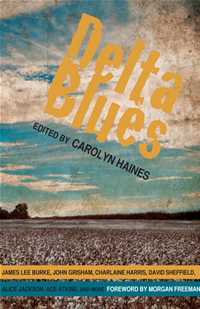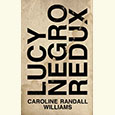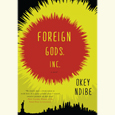True Blues
In a new anthology, crime writers riff on the music of the Mississippi Delta
Raw emotion fuels the blues. It’s the music of the soul laid bare, and its transcendent magic arises from the earthiest human experiences, so who better to provide a literary riff on the blues than crime writers, the chroniclers of the rough side of life? That seems to be the idea behind Delta Blues, an anthology that pays homage to the music of the Delta. Many of the nineteen new stories were penned by award-winning crime and mystery writers.
Editor Carolyn Haines, author of the Sarah Booth Delaney mysteries, snagged some big-name contributors for Delta Blues, including John Grisham, James Lee Burke, and Charlaine Harris (of True Blood fame), but there are also lesser-knowns and relative novices, including Memphian Daniel Martine, an actor and film producer. The mix of writers makes for a lively, though uneven, collection that is heavy on action and light on literary acrobatics. It will please crime and mystery fans, but the blues hook pulls many of the stories far enough way from genre conventions to interest a wider readership.
 Most of the authors took their mission to write about the Delta blues quite literally, which creates a sort of echo effect in the collection. Memphis and Clarksdale, Mississippi, are practically recurring characters in these stories, as are cotton fields. There are multiple references to Robert Johnson’s legendary pact with the devil—Charlaine Harris reworks the old story with a voodoo reference, and Daniel Martine gives it a gruesome psychosexual twist. The music itself has a role in every story, but it’s not always a featured player. The blues have a mere a cameo in John Grisham’s “Fetching Raymond,” a wrenching, beautifully written story about an execution.
Most of the authors took their mission to write about the Delta blues quite literally, which creates a sort of echo effect in the collection. Memphis and Clarksdale, Mississippi, are practically recurring characters in these stories, as are cotton fields. There are multiple references to Robert Johnson’s legendary pact with the devil—Charlaine Harris reworks the old story with a voodoo reference, and Daniel Martine gives it a gruesome psychosexual twist. The music itself has a role in every story, but it’s not always a featured player. The blues have a mere a cameo in John Grisham’s “Fetching Raymond,” a wrenching, beautifully written story about an execution.
The standout story in Delta Blues is James Lee Burke’s “Big Midnight Special.” Burke’s tale of a blues-playing prison inmate struggling to preserve body and soul is a taut thriller from beginning to end, but it’s also a meditation on the conflict between America’s ideals and its brutal history. The story is told by the convict, Arlen, a man for whom the contradiction is always visible, as when he watches a group of women gather on the levee where uncounted prisoners are buried: “I suspect they’re praying or performing a benediction of some kind. I wonder if in their innocence they ever think of the rib cages and skulls buried beneath their feet.”
Nothing else in the collection rises to the level of Burke’s story, but there are a number of other excellent pieces here. “Run Don’t Run” by Nashvillian Mary Saums turns a stock piece about a burned-out cop into a tribute to the creators of the blues, people who “know the horrors of the world but they keep on moving through it.” Suzanne Hudson’s “All the Way to Memphis” is a darkly funny story that illustrates how even a prim, sixty-something librarian can come to know a lot about the blues.
It must be said that a few of the stories in Delta Blues seem tossed off and might have benefited from a little more editorial intrusion, but there are more than enough gems to make the collection worthwhile. Tyrus Books, the publisher of Delta Blues, will donate one dollar from the purchase price of every copy to the Rock River Foundation, a nonprofit organization that promotes literacy in the Mississippi Delta region, so readers can take comfort in knowing they’re doing a good deed as they dig into the raw, rough world of Delta Blues.


